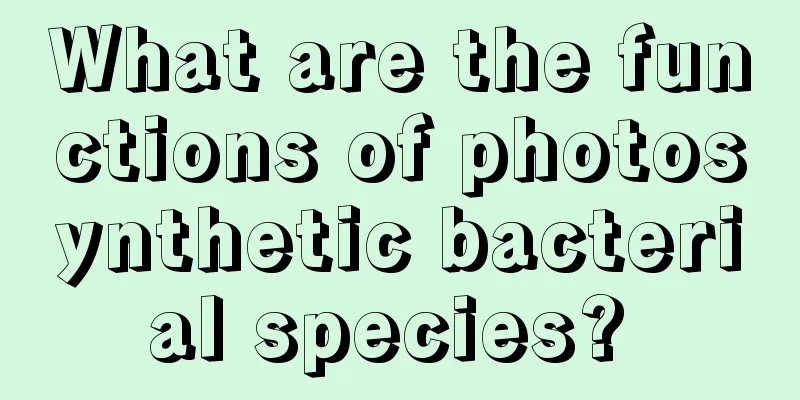What are the functions of photosynthetic bacterial species?

|
The growth of plants is inseparable from photosynthesis, and photosynthetic bacteria are a type of microorganism that can carry out photosynthesis, with the characteristics of high nutrition, high efficiency, and versatility. In today's aquaculture, planting and other industries, photosynthetic bacteria play an irreplaceable role and can help increase income in the aquaculture and planting industries. Next, I will introduce the functions of photosynthetic bacteria in detail! What are photosynthetic bacterial species? Photosynthetic bacteria are a type of microorganism that possesses photosynthetic pigments and can carry out photosynthesis. It is a highly nutritious, high-efficiency and multi-purpose biological product. Photosynthetic bacteria are rich in nutrients, containing protein, fat, soluble sugars, carotene, vitamin B and 16 kinds of amino acids. While absorbing light energy and carbon dioxide, photosynthetic bacteria can also use the organic acids, hydrogen sulfide and ammonia produced by the decomposition of residual organic matter in the water by foreign microorganisms, thereby achieving the purpose of purifying the water and providing food for organisms on the next level of the food chain, thus becoming an important link in the food chain in water. Light and bacteria have a strong ability to utilize light energy. Calculated by the volume of the organism, the ability of microorganisms to absorb carbon dioxide is 100 times that of forests. Because photosynthetic bacteria are rich in nutrients and have unique functions, they are widely used in various industries such as breeding, planting, medicine, and environmental protection. Effects of using photosynthetic bacteria in aquaculture 1. Purify water quality and extend water change time; 2. Maintain the microecological balance of the water environment; 3. Absorb oxygen consumption factors in water and increase oxygen in water; 4. Reduce the use of antibiotics and improve the quality of aquatic products; 5. Increase the zooplankton in the water as bait. The role of photosynthetic bacteria in planting 1. As a plant conditioner and fertilizer; 2. Separate the hydrogen in the soil and use the secretions from the roots of plants, organic matter in the soil, harmful gases (such as hydrogen sulfide), carbon dioxide, nitrogen, etc. as the matrix to synthesize sugars, amino acids, vitamins, nitrogen compounds and physiological substances to provide plant nutrition and promote plant growth; 3. The metabolites of photosynthetic bacteria can not only be directly absorbed by plants, but also become nutrients for the reproduction of other microorganisms, increasing the beneficial bacteria in the soil; 4. Help plants to carry out photosynthesis and absorb nitrogen, phosphorus, potassium and other elements from the atmosphere and soil, thereby reducing the use and residue of pesticides and fertilizers, improving the quality of agricultural and sideline products, and increasing economic benefits. |
<<: How long does it take to treat patellar chondromalacia? What are the treatments?
>>: Can fig leaves cure leukoplakia
Recommend
Early signs of gallbladder cancer
Gallbladder cancer is a common malignant tumor of...
Race is one of the causes of melanoma. Two methods are recommended to treat melanoma
Melanoma is a malignant skin tumor. A lot of medi...
Will eating oranges cause getting a sore throat? How can we eat oranges without getting a sore throat?
Will eating oranges cause you to get irritated? O...
Can children take metoclopramide to treat gastritis?
Because of colds, fevers, viral infections, and s...
Can pomegranate seeds be eaten? What are the benefits of eating them?
I believe everyone has eaten pomegranates. This f...
What exercise helps you grow taller?
I believe that almost everyone hopes to grow tall...
Housewives, learn this! Add one more step to cooking and your whole family will not get cancer
"Frying, stir-frying and deep-frying" a...
What tests should kidney cancer patients undergo?
The chief complaints and clinical manifestations ...
Will orthodontic correction make teeth loose?
Although teeth grow inside our mouths, once they ...
Which is more serious, cervical cancer or uterine cancer
Uterine cancer and cervical cancer are both commo...
Breast milk causes pimples under the armpits
During the breastfeeding stage, any changes in th...
Is prostate cancer hereditary?
Prostate cancer is a common male disease. Patient...
What medicine is good for low blood pressure
Blood pressure can be low or high, it doesn’t mat...
Recurrence rate of nasopharyngeal carcinoma after five years of treatment in the middle and late stages
Recurrence rate of nasopharyngeal carcinoma after...
What adverse reactions may occur when using Fuyanxiao Capsules?
Fuyanxiao Capsule is a common medicine. This medi...









